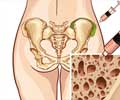- Multiple sclerosis is a central nervous system disorder that affects the spinal cord and the brain.
- High-dose of immunosuppressive therapy followed by stem cell transplantation can induce long-term remission of multiple sclerosis.
- 69% of participants from the trial were found to survive without any progression of disability and symptoms of multiple sclerosis.
Anthony S.Fauci, M.D., said, "These extended findings suggest that one-time treatment with HDIT/HCT may be substantially more effective than long-term treatment with the best available medications for people with a certain type of MS."
"These encouraging results support the development of a large, randomized trial to directly compare HDIT/HCT to standard of care for this often-debilitating disease."
Multiple sclerosis includes weakness, fatigue, chronic pain, motor and speech difficulties. The relapsing-remitting multiple sclerosis is the most common form of multiple sclerosis which is characterized by mild or no symptoms. This disease can over the years shift to a progressive form.
Clinical Trial
The research team studied the safety, efficacy and durability of high-dose immunosuppressive therapy and autologous hematopoietic cell transplant (HDIT/HCT) with 24 participants who had relapsing-remitting multiple sclerosis. These volunteers were between the age of 26-52 years. The participants inspite of taking medications, were found to experience active inflammation, which is evidenced by frequent relapses and worsening neurological disability.
The treatment had some risks and most of the participants experienced side effects such as infections. Three of them died during the study and none of the deaths were related to the treatment.
Richard Nash, M.D.of Colorado Blood Cancer Institute and Presbyterian-St.Luke’s Hospital, principal investigator of the study, said, "Although further evaluation of the benefits and risks of HDIT/HCT is needed, these five-year results suggest the promise of this treatment for inducing long-term, sustained remissions of poor-prognosis relapsing-remitting MS."
Daniel Rotrosen, M.D., director of NIAID’s Division of Allergy, Immunology and Transplantation, said, "If these findings are confirmed in larger studies, HDIT/HCT may become a potential therapeutic option for patients with active relapsing-remitting MS, particularly those who do not respond to existing therapies."
Multiple Sclerosis
Multiple sclerosis is a central nervous system disorder which affects the brain and spinal cord. Around 100,000 people in the United Kingdom have multiple sclerosis. Women are three times more likely to suffer from multiple sclerosis when compared to men.
Multiple sclerosis is usually diagnosed between the age of 20 and 40. Around 2-5 % of children have multiple sclerosis.
References
- Richard A. Nash, George J. Hutton, Michael K. Racke, Uday Popat, Steven M. Devine, Kaitlyn C. Steinmiller, Linda M. Griffith, Paolo A. Muraro, Harry Openshaw, Peter H. Sayre, Olaf Stuve, Douglas L. Arnold, Mark H. Wener, George E. Georges, Annette Wundes, George H. Kraft, James D. Bowen. High-dose immunosuppressive therapy and autologous HCT for relapsing-remitting MS. Neurology, 2017; 10.1212/WNL.0000000000003660 DOI: 10.1212/WNL.0000000000003660
- What is MS? - (http://www.ms-uk.org/whatisms )
Source-Medindia















